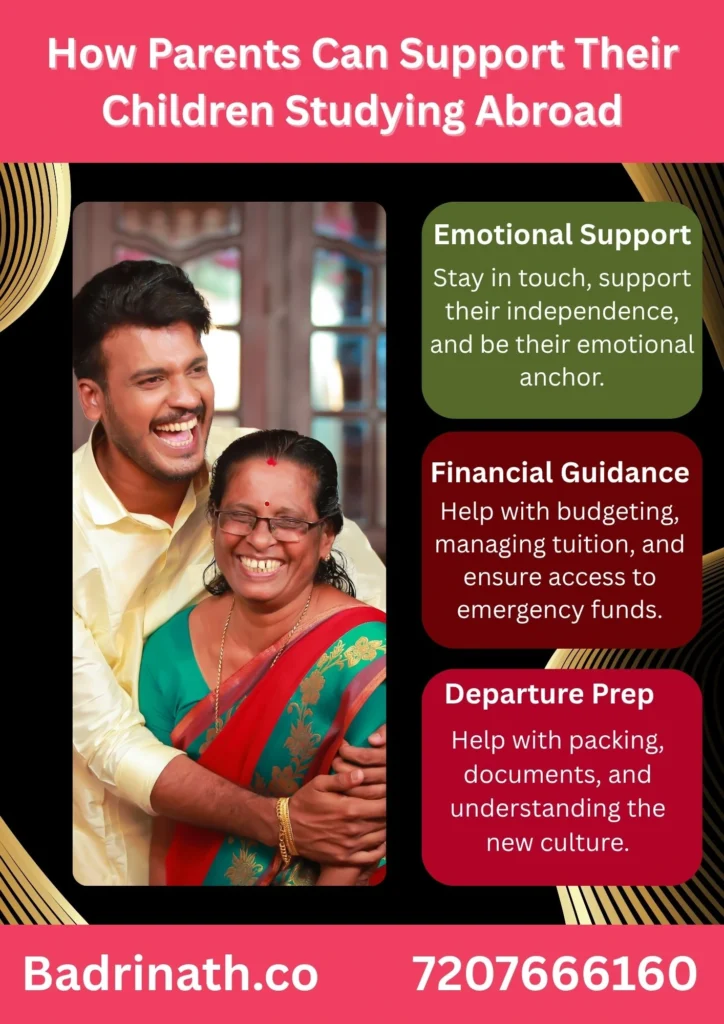Leaving the nest and flying to a different country can be an emotional storm—for both students and their parents. When a child goes abroad for higher education, the excitement is mixed with anxiety, pride comes with concern, and joy often walks hand-in-hand with worry. But even from thousands of miles away, parents can offer incredible support that shapes their child’s success, well-being, and growth overseas.

Emotional Support From a Distance
Staying Connected Without Smothering
One of the best things parents can do is maintain open lines of communication. A daily “How are you?” text or weekly video call can offer comfort—but it’s also essential not to overdo it. Children abroad are trying to adjust to a new environment, schedule, and pace. Let them breathe, but be available when they need you.
Handling Homesickness with Compassion
There will be moments when your child feels low, overwhelmed, or lonely. Don’t rush to “fix” things—sometimes, they just need to vent. Listen without judgment, offer reassurance, and remind them of their strengths. A kind word from home can go a long way.
Being Their Emotional Anchor
From missed trains to failing assignments, not everything will go smoothly. In these moments, your voice can be their anchor. Remind them that setbacks are normal, and they don’t define who they are.
Practical Preparations Before Departure
Guiding Through the Documentation Process
Help your child navigate the maze of visas, passports, university forms, health insurance, and accommodation. It’s not about doing everything for them—it’s about showing them how to manage complex processes independently.
Teaching Life Skills (Cooking, Budgeting, Health)
Before departure, ensure they can handle basic life tasks—making a meal, using a washing machine, managing a monthly budget, or booking a medical appointment. These skills are the foundation of independent living.
Setting Realistic Expectations
Talk about what life abroad is really like—the good and the hard parts. Don’t paint a picture-perfect fantasy. Instead, prepare them for both success and struggle, so they’re emotionally ready.
Financial Management and Support
Planning and Budgeting Together
Sit down with your child and create a realistic monthly budget. Help them understand how to manage expenses like rent, groceries, transport, and leisure.
Banking and Money Transfers
Set up a reliable international banking system—forex cards, wire transfers, or digital wallets. Ensure they know how to access funds and protect themselves from scams.
Teaching Responsible Spending
Avoid making money feel unlimited. Discuss financial responsibility, the importance of saving, and being mindful of spending.
Academic Encouragement Without Pressure
Understanding the Academic Environment Abroad
Academic styles abroad may differ greatly from Indian education systems. Encourage your child to adapt and engage in open discussions, group work, and presentations.
Celebrating Efforts, Not Just Results
Don’t just wait for grades—celebrate effort, growth, and perseverance. Your child is not only studying but also adapting to a whole new culture and lifestyle.
Encouraging Use of Campus Resources
Promote the use of libraries, counseling centers, career services, and tutoring programs. These services exist to help students succeed.
Supporting Social and Cultural Adjustment
Helping Them Step Out of Their Comfort Zone
Making new friends in a new country is intimidating. Encourage your child to attend orientation events, community dinners, or club meetings.
Encouraging Involvement in Activities and Clubs
Joining a dance club, photography group, or international student organization helps build a social support system and gives a sense of belonging.
Being Patient with Cultural Shocks
They might complain about food, weather, or social norms. Instead of brushing it off, help them process the change and adapt.
Health and Well-Being
Promoting Physical Health Habits
Talk about the importance of healthy eating, regular sleep, and physical activity. Remind them to not skip meals during stressful weeks.
Addressing Mental Health Positively
Normalize the idea of therapy, counseling, or just talking to someone. Be open and non-judgmental about mental health.
Knowing Local Emergency Contacts
Keep a list of your child’s university contacts, embassy numbers, and emergency services. Share a copy with them and one for yourself.
Encouraging Independence
Balancing Support and Freedom
It’s natural to want to help at every turn, but real growth happens when kids solve their own problems. Be the safety net, not the puppet master.
Letting Them Make (and Learn From) Mistakes
They’ll forget keys, burn dinner, and miss buses—and that’s okay. These experiences shape maturity. Let them stumble and get up on their own.
Building Long-Term Confidence
When they handle challenges alone, confidence builds naturally. Trust your parenting—you’ve already taught them so much.

Planning Thoughtful Visits
Visiting at the Right Time
Don’t land up during finals week. Plan your visit around semester breaks, festivals, or long weekends.
Respecting Their Routine During Visits
Let them continue their routine. Don’t expect to be entertained 24/7—blend into their world instead of disrupting it.
Avoiding Overinvolvement
Even during visits, avoid taking over. Let them show you how they live now. Support their independence by celebrating their autonomy.
Conclusion
Your child may be studying abroad, but your role as a parent hasn’t ended—it has simply evolved. From offering emotional strength to practical advice, your support helps them not just survive but thrive in their new life. Be their guide, cheerleader, and calm in the storm—because even from across the ocean, your support is what keeps them grounded.
External Links:
15 Questions for Parents of International Students
Guide for parents: How to help your child go abroad for studies
Internal Links:
Top 10 Game-Changing Scholarships for International Students in the US






